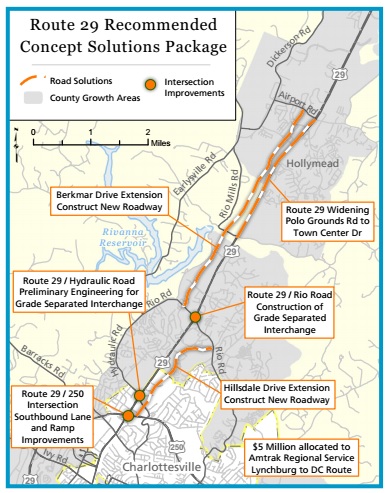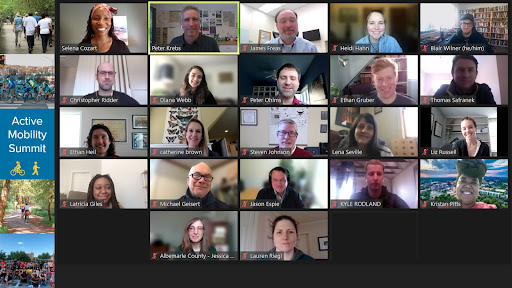On February 28, representatives from organizations, local businesses, agencies and passionate individuals who share a mission to promote walking, biking, running, everyday access to nature and active lifestyles gathered for a free, half-day workshop to identify areas of collaboration and lay out work plans. About 30 people joined the Zoom-based meeting to check in with one another about collective work started at last year’s first virtual Mobility Active Summit.
Western Bypass
The Western Bypass just north of Charlottesville was a $200-500 million road project that even VDOT studies showed wouldn’t relieve congestion on 29 North. All the same, proponents pushed hard to get the road built.</p
Route 29 Improvements on Track in Charlottesville
In our last newsletter, we shared great news regarding the demise of the ill-conceived Western Bypass. As you might recall, a major blow to the project had been delivered back in February, when the Federal Highway Administration (FHWA) announced serious reservations about the viability of the project. It made it clear that the necessary federal approvals were indoubt unless VDOT reevaluated the entire project, including a new review of alternatives.

Western Bypass Shelved
Big things are happening, or rather not happening, with the costly Western Bypass of U.S. Route 29 just north of Charlottesville. We’re enthusiastic to report that the ineffective project has come to a halt, and we’re hoping this time it will be a permanent road block. With the Bypass off the table, we can finally get to work on fixing Route 29 for the majority of its travelers.
A Real Chance
Email alert text: The 2013 Election Day results show without question that the Western Bypass was a key concern for county voters. Now, with a new Board of Supervisors and a new administration in Richmond, we have a real chance to stop the construction of the Bypass and reallocate funding to more effective transportation projects.
Transcript of WINA interview with former CTB member Jim Rich
Charlottesville Right Now, Thursday, May 30, 2013
Jim Rich, a former member of the Commonwealth Transportation Board, shares his thoughts on the Western Bypass.
CATCO Green Book
The Charlottesville-Albemarle Transportation Coalition (CATCO) is a citizen group formed in 1988 to respond to proposed improvements to the local Rt 29 corridor. Their objective was the development of real solutions to emerging congestion problems. Their work included opposition to the Western Bypass, specifically after it was elevated as a priority ahead of previously agreed upon, more effective solutions. The CATCO Green Book summarizes these efforts through 2000. It provides an invaluable digest and summary of the genesis of the Western Bypass and why this community has long opposed it.
Fuzzy Math, Shoddy Design
The saga continues. In order to keep the Rt. 29 Western Bypass proposal within their budget, VDOT accepted a “modified design” to the southern terminus last year that is significantly different than the one presented in VDOT’s Environmental Assessment. And it is now becoming clear that there are some major flaws in this cheap design — flaws related to traffic flow and safety, and that actually increase the travel time on the Bypass. This text is from an email alert we sent out on May 14th.
Rt. 29 Western Bypass Not Shovel Ready
When it comes to the Western Bypass, I feel like I’ve been jumping up and down for a while, trying to get the decision-makers to pay attention. But quite recently, a number of things have happened that give me hope, and it’s time to get our U.S. Senators involved.
Army Corps & EPA Call Out Flaws in Western Bypass Review
[12/17/12] This has not been a good few weeks for those pushing the Rt. 29 Western Bypass. In late November, a letter from the Environmental Protection Agency was made public that calls into question the draft Environmental Assessment prepared by VDOT. And just last week, a letter from the Army Corps of Engineers came to light, which says:
Charlottesville Western Bypass: Not just a local issue
In June 2011, the Albemarle County Board of Supervisors shocked constituents by holding an unpublicized, late-night vote to resurrect the Route 29 Western Bypass, northwest of Charlottesville. Since then, VDOT—under pressure from political interests in Lynchburg and the McDonnell administration—has put the Bypass on the construction fast-track. While communities north of Charlottesville may think this bypass is only a local issue, there are compelling reasons for Virginians everywhere to pay attention—and it’s not just the quarterbillion dollar price-tag. Big picture: this bypass is part of VDOT’s vision to transform Rt. 29 into a Central Virginia Interstate; acting as an alternative to I-81 and I-95. This is not only a bad idea, it’s not feasible without a massive right-of-way acquisition and billions of dollars in funding.

